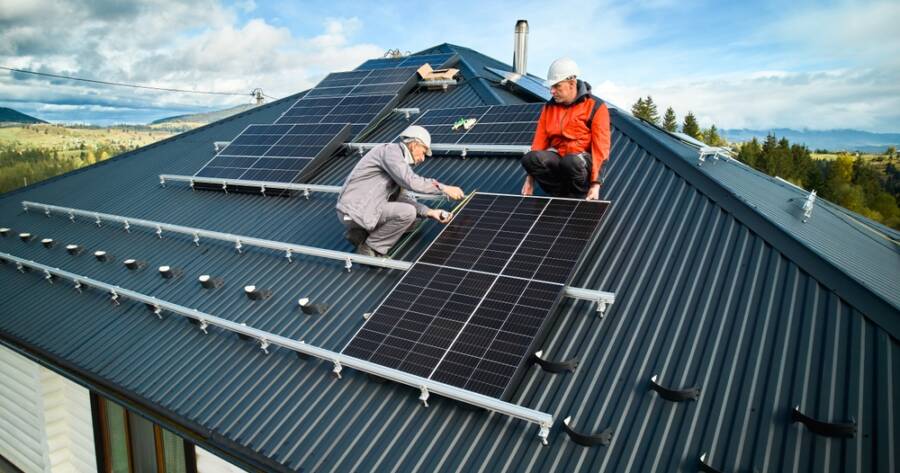Transitioning to solar energy is an increasingly popular choice for homeowners looking to reduce their energy bills and carbon footprint. By harnessing the sun’s abundant power, solar roof panels can provide a sustainable and cost-effective energy source. While upfront costs can be a consideration, the potential savings and environmental benefits make solar panels a compelling option for many. In this article, we’ll explore how solar roof panels work, their potential benefits, and the key factors to consider before making the switch.
How Do Solar Roof Panels Work?
Solar roof panels convert sunlight into electricity through a process called photovoltaic (PV) conversion. Each panel is made up of solar cells, typically composed of silicon, which absorb sunlight and generate direct current (DC) electricity. This electricity is then converted into alternating current (AC) by an inverter, making it suitable for powering household appliances and systems.
Excess energy produced during sunny days can often be stored in batteries or fed back into the grid, depending on your system’s setup and local regulations. This makes solar panels a flexible energy solution, potentially reducing dependence on traditional energy sources during peak hours or outages.
Benefits of Installing Solar Roof Panels
Potential Energy Savings
One of the most significant advantages of solar roof panels is their potential to lower energy costs over time. By generating your own electricity, you may be able to reduce or even eliminate monthly utility bills. The exact savings depend on factors like energy consumption, local electricity rates, and the size of your solar system.
Some homeowners may also benefit from net metering programs, where excess energy generated is credited back to their account, further offsetting costs. However, these programs vary by location and should be researched thoroughly.
Environmental Impact
Solar panels produce clean energy, which can help reduce greenhouse gas emissions and reliance on fossil fuels. By switching to solar power, you’re contributing to a more sustainable future and supporting global efforts to combat climate change. For environmentally-conscious homeowners, this benefit can be as important as the potential financial savings.
Increased Property Value
Homes with solar panels are often seen as more attractive to buyers, especially in areas where renewable energy is valued. While individual results vary, studies suggest that solar-equipped homes may sell for a premium compared to non-solar homes. This can make solar panels a strategic investment for those considering future property sales.
Energy Independence
Solar panels provide a degree of energy independence by reducing reliance on external providers. In areas prone to outages or fluctuating electricity rates, having a self-sufficient energy source can be a valuable advantage. Pairing your system with a battery backup can further enhance this benefit.
Key Considerations Before Installing Solar Roof Panels
Suitability of Your Roof
The effectiveness of solar panels largely depends on the orientation, slope, and condition of your roof. Ideally, your roof should have unobstructed access to sunlight for most of the day. Factors like shading from trees or nearby buildings can affect energy production. Conducting a professional assessment can help determine if your roof is a good candidate for solar panels.
Local Climate and Sunlight Availability
The amount of sunlight your area receives plays a crucial role in determining the efficiency of solar panels. While solar technology has advanced to work in less sunny regions, areas with consistent sunshine typically yield better results. Researching local weather patterns and consulting with a solar installer can provide clarity on expected performance.
Installation and Maintenance Costs
While the cost of solar technology has decreased in recent years, installation can still represent a significant initial investment. It’s important to explore financing options, such as loans or leasing agreements, that align with your budget and long-term goals. Additionally, factor in the maintenance needs of your system. Solar panels are generally low-maintenance, but occasional cleaning and inspections are essential to ensure optimal performance.
Government Incentives and Policies
Many governments offer incentives to encourage solar adoption, such as tax credits, rebates, or grants. While these programs can significantly reduce upfront costs, availability and terms often vary. Investigate what incentives are offered in your region and how they might apply to your situation.
Lifespan and Warranty
Most solar panels come with a warranty ranging from 20 to 25 years, reflecting their durability and long lifespan. However, like any system, performance may degrade slightly over time. Be sure to review warranty details and understand what is covered to protect your investment.
Making the Transition to Solar Energy
Deciding to install solar panels is a major decision that involves careful consideration of costs, benefits, and long-term goals. Partnering with a reputable solar installer is key to ensuring a smooth process, from system design to installation and beyond. Be sure to obtain multiple quotes and ask questions about the installer’s experience, certifications, and customer reviews.
It’s also worth connecting with other solar users in your area to gain insights into their experiences. Local forums or community groups can be a valuable resource for firsthand advice and recommendations.
Learn More Today!
Solar roof panels offer a promising way to save on energy costs while contributing to environmental sustainability. By generating clean, renewable energy, homeowners can reduce their dependence on traditional utilities and potentially increase their property’s value. However, as with any major investment, it’s important to weigh the benefits against factors like upfront costs, local climate, and roof suitability.
With thorough research and proper planning, switching to solar energy can be a rewarding step towards a greener, more cost-efficient future. Whether you’re driven by financial savings, environmental concerns, or energy independence, solar roof panels could be the solution you’ve been searching for.
